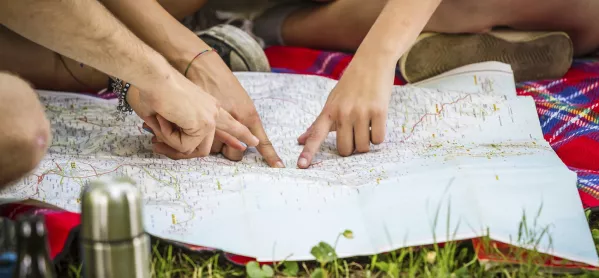Geography has never looked in a healthier state. We’ve just seen GCSE entries rise for the fifth consecutive year. At A level, geography is ranked among the fasting growing subjects. Geography graduates have one of the lowest rates of unemployment on completing their studies. And Theresa May has demonstrated that a geography degree can equip you for the highest office in the UK.
Schools and employers are increasingly recognising that geography, a subject that bridges the natural and social sciences, provides students with skills to tackle the interdisciplinary challenges of the 21st century. In my view, one of the most effective ways geography does this is through its focus on fieldwork.
Fieldwork offers school pupils the chance to explore first-hand how physical and human processes are changing our world. Rather than relying on abstract classroom concepts, they are encouraged to conduct their own investigations and to work as teams. They learn to frame questions, and collect, analyse and review data (the messiness of real-world data is a rude awakening for many!).
These skills are invaluable and the experience is formative. Many geographers go on to careers where they continue to conduct field and desk-based research, while others enter professions where their problem-solving skills and appreciation of the inter-connections between different processes and scales are vital.
Strengthening geography’s fieldwork component is something the Royal Geographical Society (with the Institute of British Geographers) has long advocated. So, we are delighted that the new GCSE and A-level geography courses, which start in September, strengthen pupils’ understanding of geographical knowledge and explicitly require schools to provide fieldwork as part of these two examination courses.
‘Reinvigorating fieldwork’
For the first time the amount of fieldwork has been quantified and schools have been given direction about what has to be provided. At GCSE, fieldwork has to be completed on at least two occasions. At A level there is a minimum of four days’ fieldwork that has to link to the course topics. There’s also a requirement for each student to complete an independent fieldwork investigation. To back this up, schools have to confirm that all their pupils have been given the opportunity to fulfil the fieldwork requirements.
Geography teachers have strongly welcomed these changes. They ensure that fieldwork is an essential and required part of a geography exam course. At the society, we see teachers up and down the country enthusiastically grasping these opportunities to reinvigorate and expand the fieldwork they will run for their students. Britain’s urban and rural landscapes provide geographers with an enviable wealth of good fieldwork sites to choose from.
However, despite the new requirements, we understand that there remain some headteachers who view fieldwork as a burden, a “disruption” to the timetable, and not an essential element of geography. It is of significant concern when we hear of geography teachers being confronted by school leaders disbelieving about the new requirements. “Can’t you do this in the classroom?” is a not-infrequent question. This is as misguided as expecting science students never to turn on a Bunsen burner or musicians never to touch a piano.
I recognise headteachers will be pouring over their pupils’ examination results with an eye on the all-important league tables. But I would ask them to spare some time to also talk with their head of geography to explore where, when and how to programme their schools’ future fieldwork. Such fieldwork will not just be necessary for the examinations their pupils will face, it will also ensure that the next generation gain the skills needed to help tackle the challenges of the future.
Dr Rita Gardner is director of the Royal Geographical Society
Want to keep up with the latest education news and opinion? Follow TES on Twitter and like TES on Facebook

